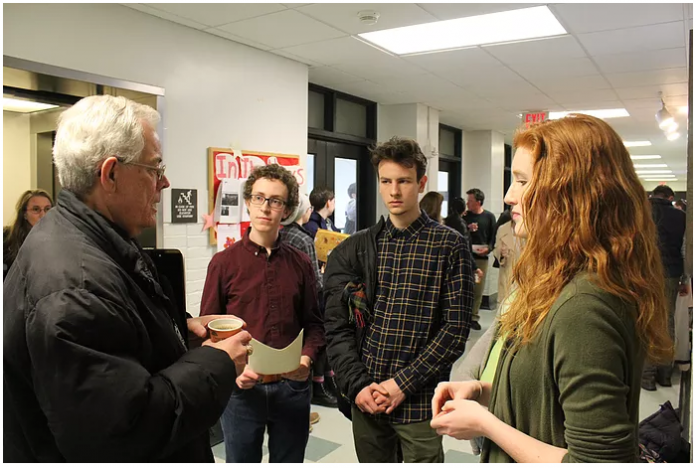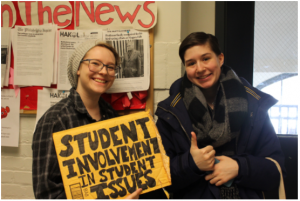
A student protest on a change in academic policy brought to a head a major problem in the dissemination of information between the students, SGA and administration.
The Academic Policy Committee, or APC, discussed two items with the faculty at a meeting held on Friday, Mar. 17. According to a document that was e-mailed to faculty before the meeting, the first item on the agenda was the proposal to eliminate the Bachelor of Liberal Arts and Sciences Dual Degree, which passed without much discussion. The second item, which was sent back to the APC for amendment, however, caused concern for some students.
Under the proposed system, students would need only 32 credits to graduate, as opposed to the current 34. During normal registration, students would not be able to sign up for more than 4.5 credits. After registration for all classes has closed, students can then go back in and add on an additional single or half unit to total five credits. Students wishing to schedule more than five units would need to submit a petition to the Dean of Academic Life. Currently, students can register for 5.5 credits during normal registration, and need to petition for more.
After hearing about the proposed decision, Weston Conner ‘18 and Johnny Tamburro ‘18 used Facebook to organize a protest of about a dozen students. The protesters stood outside the lecture hall where the meeting was held and tried to persuade entering faculty to vote against the policy change by sharing their personal stories. Tamburro, for example, took five courses before declaring his major junior year.
Laine Flores ‘20, said that one of the main reasons she chose Muhlenberg was that it allowed a flexible schedule to set her on a path to double major in neuroscience and theatre.
“I knew I have two very different passions, science and theatre,” said Flores. “I didn’t really think those were going to be compatible easily in college, but knowing that I had the flexibility to take 5.5 credits made me feel a lot better.”
Although the original proposal did not make it impossible to take more than 5.5 credits, as Conner points out, it puts more barriers in the way.
“Truly the rationale that they’re presenting is that these proposals, these policies, are going to limit the amount of classes people are taking,” said Conner. “It’s going to discourage people from doing more and the fact that that’s the point is what’s concerning.”
Conner referenced the e-mail to faculty, which states that institutions similar to Muhlenberg have a minimum of 32 credits to graduate. The e-mail reads: “If we believe that our courses are equivalent to four semester hours, then moving to a culture where 4 or 4.5 units becomes more common we will find ourselves aligning with national norms.”
In addition to issues with transparency, both Conner and Tamburro characterized the policy as a significant blow to the Liberal Arts mission of the College.
“It’s going to change the culture that’s here, this culture of exploration, this culture of feeling free to take a lot of classes and involve yourself in a lot of things, to learn about what you’re interested in,” said Conner, “and I think that’s what’s kind of at risk here.”
Interim Provost Kathy Harring and Curtis Dretsch, the Chair of the APC, explained that the policy is really all about fairness.
“It is actually a return to an older policy,” said Dretsch. “It is fundamentally about fairness so that juniors and seniors will need to think intentionally in collaboration with their adviser about their first 4.5 credits, and then after the entire student body has an opportunity to register, students can add up to 5.5 credits.”
No petition is required for up to 5.5 credits. Students wishing to take more than 5.5 credits will need to submit a petition, just like the current system.
This change, added Harring, is not meant to hinder anyone.
“We do not want any changes to disadvantage any particular group or pattern of students,” said Harring.
It is not just the policy that is a concern to students, however.

“There are a couple different things that are concerning me about how all this went down,” said Conner. “First of all, despite the fact that there are student representatives on the APC, and that they are supposed to report to Student Government, I don’t believe that anybody, or at least very few people, have heard about this before relatively recently. So this lack of transparency, even if it is there on paper, is slightly concerning to me.”
Flores agreed, saying “It sounds like the APC and administration made the effort towards transparency. It’s a failure of the system and with SGA if the information was not relayed down to the students.”
One of the students at the protest arrived carrying a sign reading “Student Involvement in Student Issues.”
SGA has since released two statements on the issue on Facebook, saying the two student representatives on APC have reported back to the General Assembly meetings. One of the representatives, Christian Balodis ’17, is the current Vice President of SGA. The other APC representative, Robert Meyer ’18, is unaffiliated with SGA. Although these meetings are open to the public, meeting minutes from the last two semesters were not posted until Tuesday morning. Meeting minutes that SGA reportedly claimed were available through Facebook were posted on the evening of Mar. 20.
A Facebook statement from Mar. 20 read: “Minutes from last semester’s SGA meetings and this semester will be live on the website as of tomorrow evening. The minutes from December 8th, 2016 include an APC report.”
The particular role played by student reps in APC is explained by Balodis and Meyer.
“The Academic Policy Committee is required to have student representation as appointed by the SGA E-Board,” stated Balodis and Meyer, “The APC is not required to ask for student input outside of this representation. Nevertheless, the APC student representatives provided several reports to the full assembly to the Student Government Association which provided additional input that was taken back to the Academic Policy Committee.”
Had there been more discussion about the policy before it was taken to a vote, Conner and Tamburro say, they would have joined the discussion.
“I was not aware this policy was ever discussed,” said Tamburro. “A big driving force in my involvement in this issue was the lack of available information and my own personal frustration with the implications of the policy. If someone on SGA were to poll me and ask what I thought, I’d give much the same answers I’ve been giving recently, however I would trust the SGA to figure out what the student body at large would want and to advocate for us.”
Overall, this instance has brought to light issues with communication, which can hopefully be resolved in the near future.
“What we really need to do is to have more time to deeply reflect, analyze, and engage in dialogue with one another,” said Harring. “That takes time, and time is a resource.”
Time is certainly something they will all have as the policy returns to APC for further review.
Mar. 22, correction: This article has been updated to reflect the accurate affiliation of student APC members with Muhlenberg College Student Government.





















